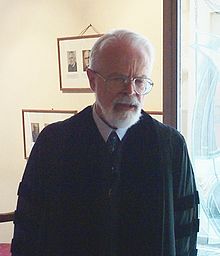Robert Merrihew Adams
Robert Merrihew Adams | |
|---|---|
 | |
| Born | September 8, 1937 Philadelphia, Pennsylvania, US |
| Alma mater | |
| Spouse(s) | Marilyn McCord Adams (m. 1966; died 2017) |
| Era | 20th-century philosophy |
| Region | Western philosophy |
| School | Analytic |
Main interests | |
Notable ideas | Divine command theory |
Influences
| |
Robert Merrihew Adams FBA (born 1937) is an American analytic philosopher of metaphysics, religion, and morality.
Biography[edit]
Adams was born on September 8, 1937, in Philadelphia, Pennsylvania. He taught for many years at the University of California, Los Angeles, before moving to Yale University in the early 1990s as the Clark Professor of Moral Philosophy and Metaphysics. As chairman, he helped revive the philosophy department[1] after its near-collapse due to personal and scholarly conflicts between analytical and Continental philosophers.[2] Adams retired from Yale in 2004 and taught part-time at the University of Oxford in England, where he was a senior research fellow of Mansfield College. In 2009 he became a Distinguished Research Professor of Philosophy at the University of North Carolina at Chapel Hill.
Adams's late wife, Marilyn McCord Adams, was also a philosopher, working on medieval philosophy and the philosophy of religion and was the Regius Professor of Divinity at Christ Church, Oxford. In 2013 both became visiting research professors at Rutgers University, in conjunction with the founding of the Rutgers Center for the Philosophy of Religion.[3]
As a historical scholar, Adams has published on the work of the philosophers Søren Kierkegaard and Leibniz. His work in the philosophy of religion includes influential essays on the problem of evil and the relation between theism and ethics. In metaphysics, Adams defends actualism in metaphysics of modality and Platonism about nature of so-called possible worlds. He is a past president of the Society of Christian Philosophers. In 1999, he delivered the Gifford Lectures on "God and Being". He was elected a Fellow of the British Academy in 2006[4] and was elected a Fellow of the American Academy of Arts and Sciences in 1991.[5]
Selected works[edit]
- "Must God Create the Best?", Philosophical Review, LXXXI 317–332. 1972. Reprinted in The Virtue of Faith and Other Essay in Philosophical Theology below.
- "A Modified Divine Command Theory of Ethical Wrongness" in Religion and Morality: A Collection of Essays. eds. Gene Outka and John P. Reeder. New York: Doubleday. Reprinted in The Virtue of Faith.
- "Theories of Actuality", Noûs, VIII 211–231. 1974.
- "Motive Utilitarianism", Journal of Philosophy, LXXIII 467–481. 1976.
- "Primitive Thisness and Primitive Identity", Journal of Philosophy, LXXVI 5–26. 1979.
- "Actualism and Thisness", Synthèse, XLIX 3–41. 1981.
- "Time and Thisness", Midwest Studies in Philosophy, XI 315–329. 1986.
- The Virtue of Faith and Other Essays in Philosophical Theology. New York: Oxford University Press. 1987.
- "Involuntary Sins", Philosophical Review, XCIV 3–31. 1985.
- "Divine Commands and the Social Nature of Obligation" Faith and Philosophy, 1987.
- "The Knight of Faith", Faith and Philosophy, 1990.
- "Moral Faith", Journal of Philosophy, 1995.
- Leibniz: Determinist, Theist, Idealist. New York: Oxford. 1994.
- "Things in Themselves", Philosophy and Phenomenological Research, 1997.
- Finite and Infinite Goods. New York: Oxford University Press. 1999.
- A Theory of Virtue: Excellence in Being for the Good. Oxford: Clarendon Press. 2006.
References[edit]
- ^ "Philosophy takes steps to rebuild".
- ^ "Lingua Franca - As Bad As It Gets". linguafranca.mirror.theinfo.org.
- ^ "Home". rcpr.rutgers.edu.
- ^ "Archived copy". Archived from the original on 2015-07-08. Retrieved 2015-07-07.CS1 maint: Archived copy as title (link)
- ^ "Book of Members, 1780-2010: Chapter A" (PDF). American Academy of Arts and Sciences. Retrieved 6 April 2011.
External links[edit]
- Gifford Lecture Series
- "Philosophy Takes Steps to Rebuild", Yale Daily News
- Living people
- 1937 births
- 20th-century American philosophers
- 21st-century American philosophers
- Philosophers from Pennsylvania
- Philosophers from North Carolina
- Analytic philosophers
- Christian philosophers
- Consequentialists
- Fellows of Mansfield College, Oxford
- Fellows of the American Academy of Arts and Sciences
- Fellows of the British Academy
- Metaphysicians
- Moral philosophers
- Philosophers of religion
- University of North Carolina at Chapel Hill faculty
- Yale University faculty
- American metaphysics writers
- Writers from Philadelphia
- Critics of atheism
- American Presbyterians